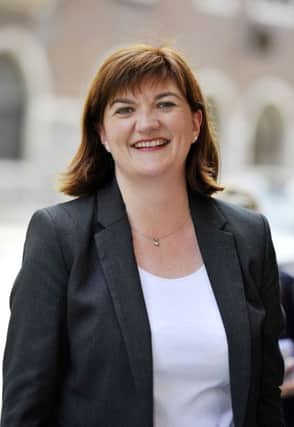Morgan warns of dangers of homophobic bullying


Figures have shown that more than half of lesbian, gay, bisexual and transgender (LGBT) young people have suffered taunts, from verbal abuse to death threats.
Ms Morgan said bullying has decreased overall but those who do suffer often retreat from school life, causing repercussions in later life as they choose “safety” over “happiness”.
Advertisement
Hide AdAdvertisement
Hide AdSpeaking at a conference at Brighton College, she said: “Homophobic bullying affects every young person seen as ‘different’ and many suffer homophobic bullying regardless of their sexual orientation. The fact is bullies will target anyone who doesn’t conform to their own views of gender stereotype. I’m talking about the girl who likes rugby, the boy who doesn’t like football. The nature of bullying has changed considerably, with social media providing an anonymous space for abuse and ridicule.” She went on: “We must not under-estimate the importance of homophobic language which has a huge effect on young people.
“The derogatory use of the word gay is offensive and unacceptable. “
Her speech comes as new university research found that some secondary schools in Yorkshire were not discussing same sex relationships as part of their sex and relationship education (SRE). Researchers at Birmingham City and Sheffield Hallam Universities conducted interviews with SRE teachers in eight secondary schools across Yorkshire. The research found that despite all claiming to be inclusive of young people’s sexual diversities, they almost always constructed young people as heterosexual in their discussions. Keeley Abbott who led the research said: “Our findings highlight a lack of understanding among teachers around what constitutes real inclusivity within the context of sex and relationship education.”
“Lesbian, gay and bisexual students could be being left vulnerable here with a lack of any sex education provision that is relevant for them.
Advertisement
Hide AdAdvertisement
Hide Ad“We need the Government to step in and make SRE statutory with a policy, ensuring that teachers reflect on all aspects of their SRE practice and work to an inclusive curriculum that takes account of young people’s varying sexual identities, relationships and cultural backgrounds.”
Dr Sonja Ellis, lecturer in Psychology at Sheffield Hallam University, added: “Teachers also need to be aware of the various ways of imposing heteronormalizing practices through their use of terminology, and should be using words such as ‘partner’ instead of ‘boyfriend’ or ‘girlfriend’.
“Teachers currently have no restrictions when deciding both their approach to and delivery of SRE. We hope that our research encourages individuals at a policy level to see that they play a crucial role in establishing a clear curriculum framework from which teachers can gain clarity and confidence.”